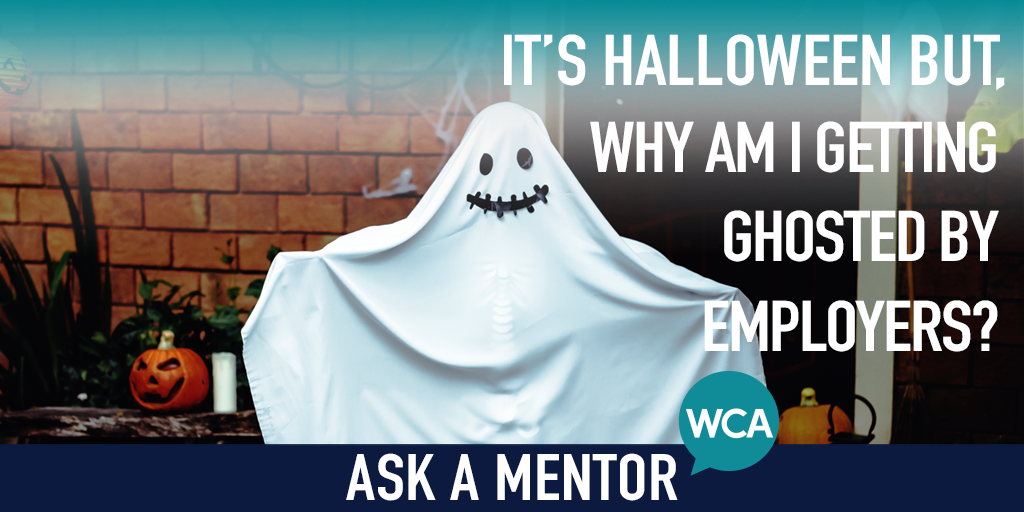Got your own career conundrum you’d like advice on?
Then sign up for the WCA peer mentoring program. It’s free to members!
Not ready to sign up yet? Submit your question to Ask a Peer Mentor.
It’s all about peers who care helping their fellow WCA members.
Compiled and edited by Julie Tereshchuk

Dear Mentors,
Isn’t this supposed to be a jobseekers’ market? So, why am I being ghosted by potential employers? And what can I do about it?
I’ve had several interviews for mid-level positions which I thought went well (one was even great, in my opinion). Yet, each time, I’ve been ghosted — no follow-up by the employer/hiring manager; no response to my (polite and restrained) enquiries.
I know it’s coming up to Halloween, but — really?
Yours,
Mentee
Dear Mentee,
As someone who has done a lot of hiring recently, this made me cringe. No matter how busy I am, I always communicate with job applicants at critical turning points.
I get that everyone – including the people running these searches – is under a huge amount of stress right now but this lack of basic courtesy tells you something important about the culture of that work place and how much they would value you as a person.
Yours,
Dear Mentee,
We’re seeing this behavior increase wildly, despite applicant tracking systems (ATSs) built to supposedly improve the process. I’ve written a bit about this recently, but the truth is that the pandemic flipped a switch in hiring and many companies have simply not adjusted. An employer could post an open role a year ago and see hundreds of applications, but now they’re seeing fewer because more candidates are going remote, plus their ATS filters are still set on pre-pandemic restrictive settings and they never see many of the applications.
So how does this lead to ghosting? We’re seeing recruiters having to work extra hard to try to find a good fit, and I suspect that with this overtime (which I believe is often a failure in the system as mentioned above), they’re having to stretch themselves too thinly. Further, layoffs at the beginning of the pandemic to trim any fat meant a lot of hiring teams are stressed, wearing far too many hats to do more than one person’s job. This means their follow-up game is weak right now, and I don’t see that changing soon.
Your two tasks right now are (1) coping, and (2) following up respectfully.
Coping is individualized, so the only real advice I can offer is to assure you that it isn’t YOU, we’re all experiencing this right now. Regarding follow-up, be persistent and be the greasy wheel, but not the screaming wheel that needs to be kicked off of the cart with force. Once or twice a month, check in via email and express kindness, not criticism.
It IS a jobseeker’s market, but the systemic change required to respond accordingly takes time and hasn’t happened, so you’re the victim of this shit and that sucks – hang in there!
Yours,
Dear Mentee,
I share the insights of my daughter Hasmig, currently seeking a position as an executive personal assistant:
“Jobseekers and job holders are noticeably younger as a whole, as are many HR, hiring, and recruiting departments. Not to sound jaded, but common courtesies that we learned would take place, like thank-you’s, follow-up letters, application status updates, and even rejection notices, seem to not be so common anymore…”
“The job market is saturated with applicants in these trying times, and so the aforementioned personnel departments are likely saturated with applications to read. If they are unlucky enough to be a department of few, or one, and without access to or user knowledge of automated HR software, it’s possible they may be overwhelmed or falling behind in their responses…”
“Being ghosted is like a punch to the gut. It’s a horrible feeling to be rejected, no matter how many times it happens, but not knowing is far worse…”
“if a company can’t respond with the most generically polite PFO email (“Please ‘F’ Off”), then it’s not you; it’s them. And while they may not be legally obligated to extend a rejection email to you, you don’t want to be working for a company that doesn’t communicate effectively, anyway.”
“My advice would be to reach out to your network and find individuals who work in HR/hiring/recruiting. They may be connected to some private HR groups on social media that can provide some insight. If possible, apply directly through the company site. It takes longer, but it may prove to be more effective than sending your application through Indeed or LinkedIn. Lastly, as you already know, don’t put all your eggs in one basket. If you’ve had a great interview, move on to a new application as soon as you can. Rejection won’t seem as bitter if you force yourself to move on. Maybe the next one will hold more potential.”
Jobseekers…. Our best wishes to you!
Yours,
- Can I fire my client? - January 3, 2026
- How can I make time to work on new business development? - September 19, 2025
- How can I get the information I need out of a job interview? - August 14, 2025

